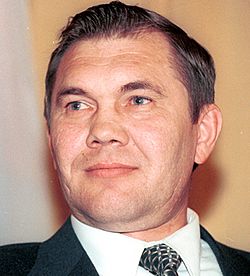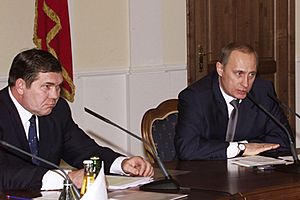Alexander Lebed facts for kids
Quick facts for kids
Alexander Lebed
|
|
|---|---|

Lebed at a 1996 news conference in Moscow
|
|
| 3rd Governor of Krasnoyarsk Krai | |
| In office 5 June 1998 – 28 April 2002 |
|
| President | Boris Yeltsin Vladimir Putin |
| Preceded by | Valery Zubov |
| Succeeded by | Alexander Khloponin |
| Secretary of the Security Council | |
| In office 18 June – 17 October 1996 |
|
| President | Boris Yeltsin |
| Prime Minister | Viktor Chernomyrdin |
| Preceded by | Oleg Lobov |
| Succeeded by | Ivan Rybkin |
| Personal details | |
| Born |
Alexander Ivanovich Lebed
20 April 1950 Novocherkassk, Soviet Union |
| Died | 28 April 2002 (aged 52) Abakan, Russia |
| Political party | Congress of Russian Communities |
| Spouse | Inna Lebed |
| Profession | Soldier |
| Awards | Order of the Red Banner Order of the Red Star Order for Service to the Homeland in the Armed Forces of the USSR (2nd and 3rd class) |
| Military service | |
| Allegiance | (1969–1991) (1991–1995) |
| Branch/service | |
| Years of service | 1969–1995 |
| Rank | |
| Commands | 14th Guards Army |
| Battles/wars | War in Afghanistan Transnistria War |
Alexander Ivanovich Lebed (born April 20, 1950 – died April 28, 2002) was a well-known Russian military officer and politician. He held important roles in the Russian Airborne Troops, which are special forces. Later, he ran for president in the 1996 Russian presidential election.
Even though he didn't win, he came in third place. After the election, Lebed became the Secretary of the Security Council of Russia under President Boris Yeltsin. He later became the governor of Krasnoyarsk Krai, a very large region in Russia. He served as governor for four years until he sadly died in a Mil Mi-8 helicopter crash.
Contents
Early Life and Military Career
Alexander Lebed was born in 1950 in Novocherkassk, a town with a history of Don Cossacks. When he was young, he enjoyed boxing and chess. His family was not rich.
In 1969, he joined the Ryazan Guards Higher Airborne Command School to become a paratrooper. In 1982, he served as a battalion commander in Afghanistan during the Soviet–Afghan War. He was well-liked by the soldiers he led.
Key Military Roles
In 1988, Lebed became the commander of the 106th Guards Airborne Division. His troops were involved in stopping protests in the Soviet Caucasus, in Georgia (1989) and Azerbaijan (1990). He refused to use harsh methods against the protesters.
By 1991, Lebed was a major general and second-in-command of the Airborne Troops. During a coup attempt against the new Russian government, he became famous. He refused to attack Boris Yeltsin at the Russian White House, which helped the coup fail.
Role in Moldova
In 1992, General Lebed was sent to Moldova to command the 14th Guards Army. There was a conflict happening between separatists and the Moldovan government. Lebed helped to end the fighting and protect ethnic Russians in the region.
His actions in Moldova made him very popular with the Russian public. Many people saw him as an honest leader who stood against government corruption.
Entering the World of Politics
After gaining public attention in Moldova, General Lebed was seen as a strong, honest leader. He joined a political group called the Congress of Russian Communities. In 1995, he left the army to focus on politics. He won a seat in the State Duma, which is like Russia's parliament, in December of that year.
Presidential Campaign in 1996
Soon after joining the Duma, Lebed announced he would run for president in the 1996 Russian presidential election. He promised to fight crime and government corruption. He also promised to end the unpopular First Chechen War.
In the first round of the election, Lebed came in third place. After this, President Yeltsin appointed General Lebed as the Secretary of the Security Council of Russia. This was a very important job in national security.
Serving in Government

Ending the Chechen War
As Secretary of the Security Council, Lebed led talks with the Chechen President, Aslan Maskhadov. In August 1996, they signed an agreement that ended the First Chechen War. This agreement was known as the Khasavyurt Accords.
However, ending the war caused some disagreements within the government. Lebed was removed from his position in October 1996. President Yeltsin said Lebed was "acting without proper authority." Despite this, Lebed decided to stay in politics.
Governor of Krasnoyarsk Krai
In 1998, General Lebed decided to run for governor of Krasnoyarsk Krai, a very large region in Russia. He wanted to leave Moscow politics behind. He won the election, even though he was new to the region.
Many people thought he would run for president again in the 2000 Russian presidential election. However, Lebed chose to stay as governor because he enjoyed the job.
Death
While serving as Governor, Alexander Lebed died in a Mil Mi-8 helicopter crash on April 28, 2002. The helicopter hit power lines during foggy weather in the Sayan Mountains.
Lebed was survived by his wife, Inna, his two sons, a daughter, and his brother Aleksey.
Political Views
General Lebed had strong opinions. He believed that Ukraine and Belarus were not truly separate countries from Russia. He thought they would become part of a new, larger state with the Russian Federation.
He was also against the expansion of NATO into Eastern Europe at first. Later, he became more open to the idea, but still thought it might cause problems.
See also
 In Spanish: Aleksandr Lebed para niños
In Spanish: Aleksandr Lebed para niños
Images for kids
-
Lebed on a 2007 stamp of Transnistria
 | Georgia Louise Harris Brown |
 | Julian Abele |
 | Norma Merrick Sklarek |
 | William Sidney Pittman |



